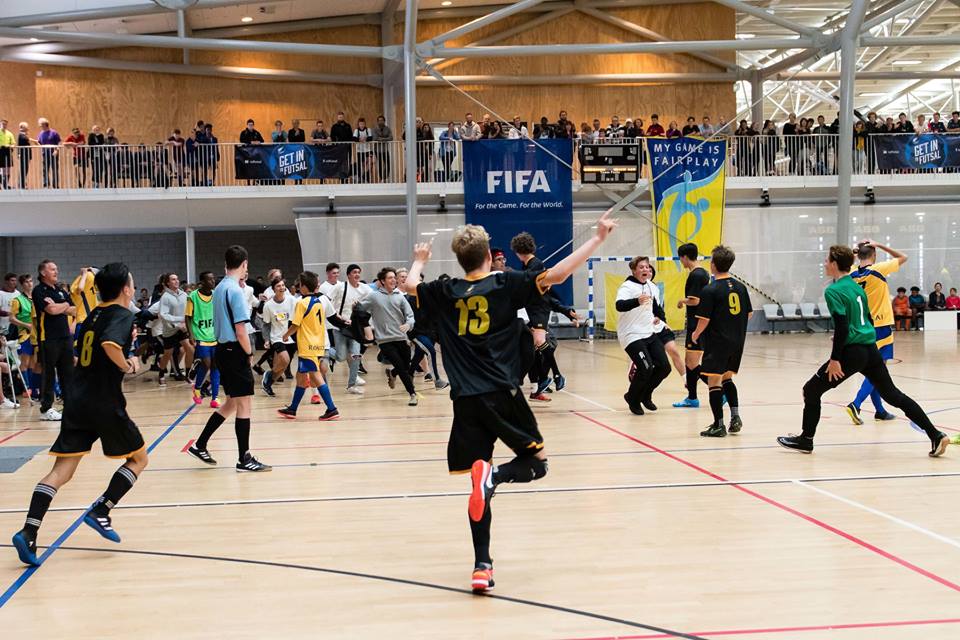|
New Zealand is considering a bid for the 2020 Futsal World Cup. The venue or precise logistics around the bid have yet to be resolved, but what is certain is that futsal is a sport experiencing massive growth, particularly at the secondary school level where the recent NZSS Championships were well attended and hotly contested. Annual growth in futsal has been around 25 percent annually for each of the past five years.
The Futsal World Cup has been running since 1989. New Zealand has never qualified in eight attempts, but have been close finishing runners-up in the Oceania tournament three times. The last World Cup was held in Colombia and won for the first time by Argentina. The event was attended by 139,307 spectators, an average of 2,679 per match. Winning hosting rights for the World Cup would be a massive fillet for a sport on the rise. Jack Piper from Capital Futsal is at the forefront of Futsal’s growth and spoke to College Sport Media about its growth, administrative challenges and plans. Piper is typically a goalkeeper for Petone in the Central League. What is the appeal of Futsal? It’s an alternative format to football that can be played year round. We’ve seen a lot of sports like sevens and floorball emerge to increase engagement in the youth space. There has been a drop off in youth participation numbers in traditional sports so futsal is a quicker way of keeping youth involved while retaining the essence of football. What are the differences in rules from normal football? It’s five a side with a goalkeeper. The rules are relatively similar to football, but there are subtle differences. Instead of a throw-in, there is a kick-in. The ball used is slightly heavier than the one outside and if you concede five fouls a half it’s an automatic penalty. Most games are played on a netball sized court, senior league courts are slightly bigger. How many teams are there in Wellington and how are competitions structured? There are 300 teams in Wellington, 215 of which are in the high school space. The season runs opposite to football in terms one and four. In terms two and three we are starting primary school leagues which is an exciting new development. Junior and adult leagues are typically played at Walter Nash Stadium, Lower Hutt, Te Rauparaha Arena, Porirua and the ASB Sports Centre, Wellington. How much does it cost to play? To enter a junior team in a six week league it costs about $250. One of the best things about futsal is that it’s relatively cheap to play. Our greatest expense is around court hire and with so many court sports that can be tricky, but were lucky we have strong relationships with the local authorities which helps keep costs down. What is the relationship like between NZ Football and NZ Futsal? In 2011, futsal was included under the New Zealand Football administrative umbrella. This has greatly increased the funding and attention Futsal receives. There are lots of skills which transition from futsal to football. Todd Bryant is the manager for the overall development and growth of futsal in Wellington. He has done a great job expanding numbers and building relationships within the local community. Is the National Secondary Schools Championships Futsal’s biggest event? Yes it is. There are over 60 teams competing nationwide, every court at the ASB Centre has been full the last few years. It’s a great atmosphere and an amazing spectacle. The standard is getting higher all the time. Capital were delighted with their results this year. Wellington schools won three of the four titles available. Who are the strongest senior teams in New Zealand? Wellington has never won a National championship, but we’ve been second a number of times and always produce a competitive team. Mainland, Auckland and Northern are typically the strongest sides. At the high performance level futsal is a growing sport, but were really encouraged by the number of quality youngsters coming through and the growing competitiveness of the National League. Tell us about the World Cup bid? I can’t say a lot about that, but it’s something were exploring. Futsal is a sport enjoying massive growth. It’s a very exciting time to be involved. |
CategoriesArchives
March 2023
|
OrganisationCollege Sport Media is dedicated to telling the story of successful young sportspeople in New Zealand
|


 RSS Feed
RSS Feed